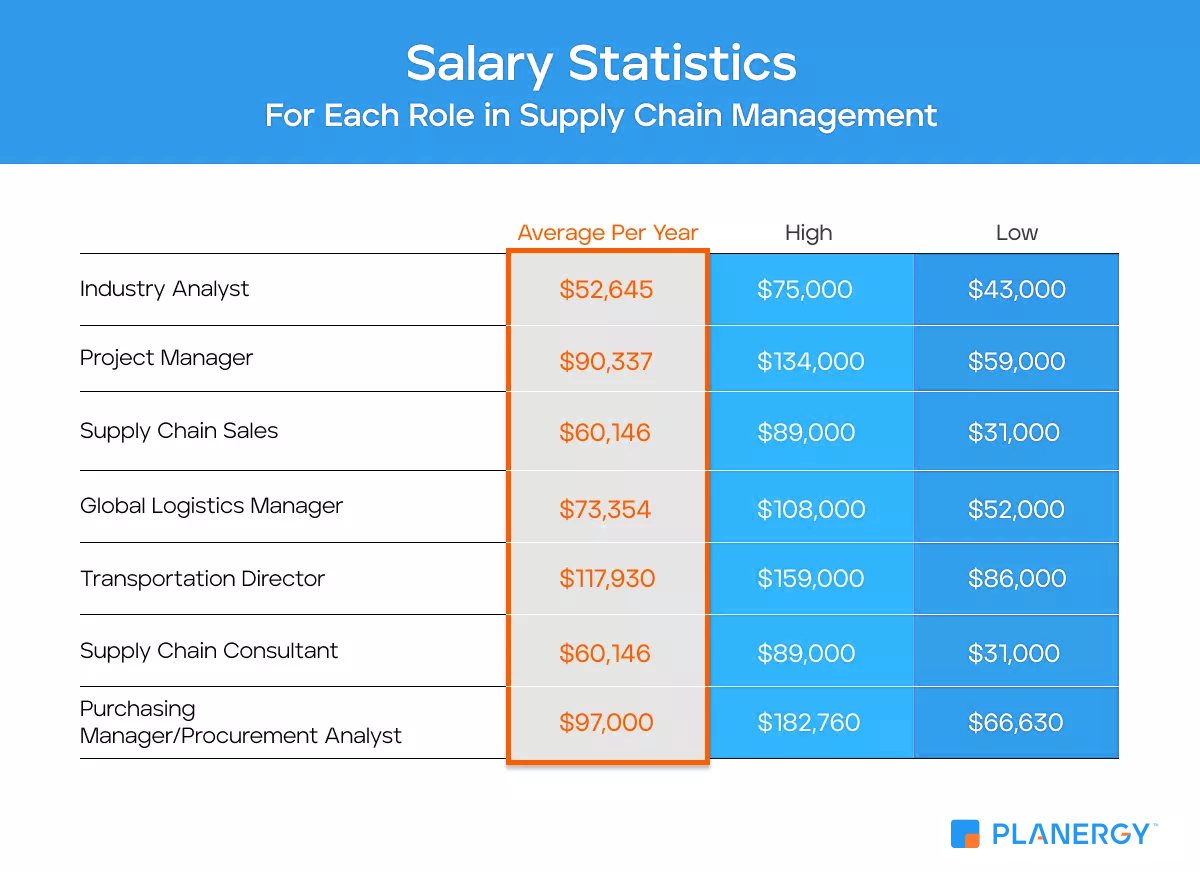According to a recent Logistics Management annual survey of logistics and supply chain salaries based on 687 respondents, the average supply chain manager salary dropped from $129,000 to $117,000.
And for employees whose primary job function is supply chain management, the salary declined from $120,000 to $110,000 in 2017.
Just because the average median salary has declined doesn’t mean you can expect a decline in yours, because of variances in demographics.
But supply chain manager isn’t the only job you can do with a supply chain management degree or background, so let’s take a look at what you can expect to earn in various positions throughout the supply chain.
Earning an advanced degree in supply chain management or logistics prepares you to enter into a highly-developed industry, projected by the United States Bureau of Labor Statistics (BLS) to grow 22% between 2012 and 2022.
Salary Statistics for Each Role in Supply Chain Management

Industry Analyst
An industry analyst will interview people across the manufacturing, inventory, logistics, warehousing and procurement departments to establish business processes and supply chain requirements.
Data from Glassdoor indicates that the national average base salary for an Industry Analyst is $52,645/year, with the low salary at $43,000 and the high end at $75,000.
Project Manager
Project managers are accountable for leading consultant teams in the day-to-day function and management of client relations.
Project managers are generally responsible for overseeing analysts and work with consultants to ensure projects are completed on time and within the set budget.
The average salary for a project manager in the United States is $90,337. Overall, salaries range from $59,000 to $134,000.
Supply Chain Sales
Supply chains sales staff are account managers who sell supply services and work with outside vendors to offer logistics services and solutions to customers in various chosen industries.
In this position, you will focus on sales and account management.
The average base pay for someone in this position is $60,146 per year, though it’s possible to earn as low as $31,000 a year and as much as $89,000 a year.
Even at the entry level, supply chain managers are looking for people with industry experience, not generalists. Though salaries vary widely from one position to another, there may be additional cash compensation, such as profit sharing, as well.
Global Logistics Manager
As a global logistics manager, you’ll oversee a range of functions, such as forecasting, planning, warehouse and distribution operations, purchasing, and customer service.
You’ll negotiate contracts with suppliers and carriers, handle the day to day management of logistic functions, and develop supply chain strategy and metrics.
As a global logistics manager, you can expect to earn an average base pay of $73,354 per year. The low end is $52,000 a year, while the high end is $108,000.
Transportation Director
The Transportation Director is responsible for overseeing the transportation of all materials and finished products – both inbound and outbound – from distribution centers.
As a transportation director, you will manage carriers, costs, and budgeting. You will also handle third-party transport providers, freight bill representation, and negotiate contracts.
Transportation directors have a national average base salary of $117,930 per year. The low salary starts around $86,000, while the high end earners bring in about $159,000.
Supply Chain Consultant
Supply chain consultants work to manage the companies you work with to provide tips and strategies to coordinate various logistics processes across multiple foreign distribution centers.
Supply chain consultants earn an average base salary of $60,146 a year, with a low end salary of $31,000 and a high end of $89,000.
Purchasing Manager/Procurement Analyst
Purchasing managers oversee a company purchasing department. Managers/analysts may work to analyze historical data such as past purchasing costs for materials, forecast future costs, or locating prospective vendors.
The role involves finding suppliers of raw goods and services, contract negotiations, and managing the suppliers once they are in place.
We’ve covered purchasing manager salaries here on the PLANERGY blog before. The earners in the bottom 10% make an average of $32.04 an hour or $66,630 a year.
Those in the top are earning $87.87 an hour or $182,780 a year, according to data from the BLS.
Salary range is commensurate with experience, as those with five or fewer years of experience tend to earn about $66,000, while those with two decades or more of experience earn around $97,000.
Of course, salaries will vary based on demographic differences – mainly the location and the size of the company.
Those working in California and New York will generally earn a higher hourly wage than those who live in Texas or Atlanta.
More than ¾ of supply chain managers in today’s supply management jobs hold either a bachelor’s degree or a master’s degree, according to information from Salary.com.
Many companies will require some level of experience – at least five to seven years in a related or similar field.
Your experience can generally be anything from logistics to project management, or purchasing, enterprise resource planning, e-business, or management.
The most common degrees are in business administration, statistics, manufacturing, management, and economics.
Some educational institutions offer specialized degrees in supply chain management, so you can appropriately plan your career path.
As companies become more aware of the impact supply chain management can have on all aspects of their business, it’s possible for the top supply chain managers to earn a place at the C-level alongside the CEO, COO, and CFO of a corporation.




